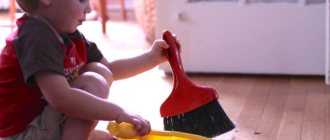In order for a person to achieve any success in life, he must be hardworking. The ability to work is not inherent in a person by nature; this skill must be developed. And the sooner the process of labor education begins, the better for the child. The most suitable period for instilling labor skills in children is the preschool period. Labor education of preschoolers sets the goal of teaching the child to be hardworking, instilling in him general labor skills, and developing a sense of responsibility for the work performed. The process of raising a preschool child is a joint activity between the preschool institution and the family.
Caring for plants and animals is one of the methods of labor education
The meaning of child labor and its types
Developing labor skills in a child is of great importance in shaping his physical and moral development. Children, mastering different types of work, gradually become more confident and physically stronger.
The labor process disciplines children and develops in them a sense of responsibility for themselves and their actions.
The importance of work in the lives of children
The types of labor depend on what the goal is and what the tasks of the labor process are:
- self-care: the child must have basic self-care skills;
- household skills;
- be able to work outdoors;
- manual labor.
Two main tasks of labor education
All types of labor are aimed at ensuring that children can master all the features of the world around them, develop the ability to think, hone their memory, study the purpose and learn to work with different tools, and become familiar with the rules for using materials. Children should master the content of the labor process by following the example of adults, imitating them, and adopting certain labor skills.
By mastering different types of work, preschoolers broaden their horizons and develop respect for their elders.
Recommendations on labor education for parents
- Adults themselves must take up work with desire . If there are constant bickering between mom and dad about who should clean up today or go to the store, the child won’t turn out to be a labor striker either.
- Cultivating hard work should begin as early as possible . Kids usually don't like to collect toys after playing, so you can do this together. All props should have their place: books are placed on a shelf, soft toys are put in a box, cars are stored in the garage.
- The desire to help, to do something on their own should not be suppressed by parents, even if after washing the plates there remains grease on them, and tying shoelaces will lead to being late for kindergarten and work. Parents should stock up on patience, as well as a certain arsenal of tasks that can be entrusted to the child.
- Any completed task must be rewarded . The most important reward is the admiration and praise of your mother. It is very important for a young assistant to realize that he is doing well and to see the benefits of the result of his work.
- Work assignments should not be in the form of coercion . It’s even better if adults do something together with children. Regular cleaning can be done in the form of a competition or game, and making dumplings or pies will turn into an unforgettable holiday.
- The child should have his own permanent feasible responsibilities . Regular feeding of fish or caring for plants will free up the elders a little, and the baby will feel important in the family team.
- Children must be aware of the end result of their efforts ; they need to be explained for what purpose certain actions are being performed: flowers may fade if they are not watered, and fish will die without food.
- Some actions need to be shown to the child in person , taught, and explained how to do them. This may be required more than once; adults need to be patient.
- It is always necessary to check the work done by the child; it must be carried out efficiently and to the end. If adults themselves correct mistakes and finish things, then they will only teach their child to avoid assignments, because there is always someone to complete the work.
Labor education of a boy
The heir will grow up to be a hard worker, unless the father himself sits idle in front of the TV, shifting all household chores onto the shoulders of his wife. The work of an older man is a clear example for a child.
Depending on the age of the son, a smart dad will involve him in all possible help: the boy can give tools, help in the garden or garage. Communication during work brings people closer together, and hammering nails or fixing an iron is not a boring task, but a most exciting activity.
Labor education of a girl
A wise mother will unobtrusively involve her daughter in helping around the house: she will teach her how to clean, do laundry, cook basic meals, and set the table. Over time, her range of responsibilities will expand, she will learn to do needlework and take care of her younger ones.
By doing work together, mother and daughter will be able to better understand each other. Patience and praise for the elder will turn into caring for her in the future. The habit of caring for others is developed from childhood.
Contents of types of work of preschool children
Self-care: Starting at a young age, preschoolers need to develop self-care skills. But during this period, due to physiological characteristics, children are still unable to perform some actions:
- babies’ fingers are not yet completely obedient;
- the sequence of performing some actions is not always remembered;
- they have not yet developed the ability to control their will.
Work for a child should be feasible and interesting.
These moments are difficult for a child, therefore, the likelihood that they will cause denial is high. What should parents and kindergarten teachers do? Nothing special, just be patient, calm and friendly. Only such means can help a child calmly accept requests to wash his face and brush his teeth in the morning, tidy up his crib, dress and undress independently, and put his toys in order.
Self-service
The means and techniques for mastering self-care activities are quite simple:
- all procedures must be performed regularly;
- monitoring the performance of actions by adults;
- the requirement on the part of adults to do all work carefully, to be tidy and to maintain cleanliness.
Self-service is the first type of work
Advice to parents: older preschoolers should be introduced to school clothes and attributes, the child’s vocabulary should be replenished, and care should be taught in handling these items. For example, prepare clothes with your child in the evening, carefully hanging them on the high chair.
Household labor
Preschoolers must master economic skills and be able to do household work. A child is quite capable of wiping dust on furniture and door handles. The child must represent the content of household work. Methods of labor education allow children in each age category to master new labor actions.
Helping parents is an example of domestic work
The means of developing skills and abilities to perform household work are varied: the child can help set the table, tidy up after himself, sweep the floor. In kindergarten, children are on duty, they also set tables, water flowers, and wipe dust on shelves and cabinets.
Adults need to adjust the content of work depending on their age group.
Advice: do not forget to praise the child, guide him, but in no case scold him, only then the educational goal will be fulfilled.
Work in nature
Labor skills performed in the natural environment are excellent means of experiencing the beauty of one’s native land, developing observation skills and improving movements. The tasks that are presented to this type of work activity are the development of volitional qualities, strength and endurance.
Cleaning the area - outdoor work
What means of labor education are used in this type of work? Children of primary preschool age can feed the fish and birds while walking. Older preschoolers can be assigned to water the flowers in a group. Parents can set similar tasks for their child at home. If the kindergarten has a corner of nature, then children can provide all possible assistance in caring for pets. Also interesting are such means as growing onions or herbs in a jar on the window, as well as observing and caring for plants sprouted from seeds.
Caring for vegetables is a very effective way of labor education
Such means of instilling a love of work in nature are very effective; children become kinder and enjoy the process of work.
Manual labor
Preschoolers should be taught to work with their hands. These are various crafts, working with different types of materials. In classes in kindergarten, children learn the skills of working with natural materials and using various improvised means and paper in creativity.
Children love to make crafts
Manual labor is designed to solve such problems as developing perseverance, developing a sense of aesthetics and patience.
Features of labor education in the family
- Parents must set a good example. If mom and dad are constantly arguing about who will go take out the trash or wash the dishes today, then it will be difficult to teach the baby to work hard.
- Labor education should begin from an early age. Typically, children do not like to clean up their toys. In this case, do it together. All toys should have their place: books on the shelf, soft toys in the basket
- If your child wants to do something on his own, don’t interfere. Even if the child didn’t wash the plate well or gets dressed too slowly. Be patient and also assign certain simple responsibilities to your baby.
- Praise your child for anything he does. It is very important for kids to understand that they are great. Parents' admiration is the best reward
- There is no need to force a child to work. The best option is joint work. Turn ordinary cleaning into a game, a competition
- Entrust your baby with regular responsibilities according to his age: feeding pets, caring for flowers. This way the child will understand that his work is very important in the family.
- The child needs to understand the result of his actions. Explain to him why he is doing this or that work: if you don’t feed the fish, they will die, and flowers will wither without water
- Some instructions may not be clear to the child, so adults need to show the child exactly how to do the work. It will probably take some time for the child to understand. Be patient and repeat as many times as necessary
- Monitor your baby. If a child does not do the job well, and the parents then finish it or redo it for him, then in the future the child will shirk from completing assignments, knowing that they will do everything for him anyway
Fostering hard work in young children
To achieve success in life, a person must be hardworking. Nature did not instill such a quality in us, so love for work must be developed. The main task of labor education for preschoolers is to teach hard work and to be responsible for the task being performed.
Labor education of children of primary preschool age begins with self-service, or carrying out simple instructions from parents in everyday life. Older children perform educational and social work. The sooner parents begin to introduce their children to household work, the easier it will be for them to cope with their work responsibilities in the future.
Each child, like any person, has his own specific interests in certain activities. And if you do not pay attention to such interest and desire of the baby, and do not engage in further development, then this interest may disappear altogether. It is important for mom and dad to support the child, as well as add something new that will help develop hard work. Combine business with pleasure in the form of play, and your child’s work will be easy; he will be interested in helping not only himself, but also those around him.
Kids love to imitate adults, it’s important not to miss this moment. Let your baby help you with simple family tasks: putting toys away, wiping the table, washing a cup, and so on. Allow your child to be independent, especially if he wants it himself.
Don't forget about rest, a little person needs it. In between work activities, allow your child to do what he likes.
Labor education of girls
Girls need to be involved in household work: taught to clean the house, do laundry, cook simple meals, and set the table. Such activities should be unobtrusive and properly organized so that the baby becomes more and more willing to help her mother. The daughter needs to understand that they need her help. As you grow older, you need to add more complex tasks: handicrafts, caring for the younger ones.
Working together, mother and daughter develop mutual understanding. In the future, all this will have a positive impact on caring for elderly parents.
Labor education of boys
The best example for a son is his father. If dad sits on the couch all day long and does not help his wife, then most likely the boy will not grow up to be a hard worker.
Depending on the age of the baby, dad can assign various work activities: helping during the repair of any items, giving tools, assisting with work in the garden or garage. A common cause promotes rapprochement and improvement of relationships. Repairing some simple household appliances can be turned into an interesting activity, stimulating the child’s greater interest.
How to develop hard work in children
For a child to become hardworking, he must be raised. But the most important thing is that he should experience joy from work.
In a playful way, children gain skills and abilities to work
Child labor is unique:
- in terms of content, the work is simple;
- actions are available;
- connection with game processes.
If you watch children, you can see that for 2-3 years the work of an adult is reflected in the game. Children imitate the actions of their elders. Let your child watch adults doing some work. Kids can wash clothes for dolls, wash soft toys, and finally tidy up their room or children's corner. Children aged 5-6 years, as well as seven-year-olds, already play situational games. Such means are excellent in developing labor skills.
Situational games - a fun method of labor education
The content of a child’s work is similar to the content of an adult’s work. It is important that work is meaningful, brings joy and ignites creative impulses.
Tips for parents
- Try to avoid concepts such as women's and men's responsibilities. There is nothing wrong with a man cleaning the floors or preparing dinner. Any work activity is worthy of respect
- There is no need to overload your child with work. Work must be within reasonable limits for a specific age and individual characteristics. Still, games for kids are the main activity
- From an early age, it is necessary to establish certain rules in the family about what is allowed and what is not allowed. The future family atmosphere in the lives of children will depend on this: lack of discipline, or order
- In order for a child not to grow up as a consumer, labor education is absolutely necessary. If you don’t teach your child to work with others, he will never learn to do something for others.
- Do not use work as a punishment, otherwise your child will develop a negative opinion about work. It is necessary to punish by depriving some kind of joy: watching TV, sweets, pocket money, etc.
- Teach your child to treat any work with care and respect. Talk with your child about your work, about the work of friends and acquaintances
Forms and methods of organizing the educational process
In a kindergarten group, children can do the following work, the purpose of which is labor education:
- Orders are the simplest methods. The baby is given a specific task that he completes. The system of individual orders has proven itself well.
- Duty - kids learn to be responsible for the assigned task, to be careful and efficient.
- Common work solves the problems of moral education. It is introduced in senior and preparatory groups.
- Business relationships are built between preschoolers in the process of common work.
What are the main means for instilling a love of work in preschoolers?
The example of adults is the best means of labor education
. Basic means:
- own labor process, which is carried out by preschoolers;
- familiarization with the process of work performed by adults;
- knowledge of the labor process through creativity and artistic development.
So, in the process of labor education, preschoolers should develop the concept of the labor process. Attitude to work and work activity, skills to perform certain types of work appropriate to age.
Preschool teachers and parents must act in cooperation and close cooperation.






